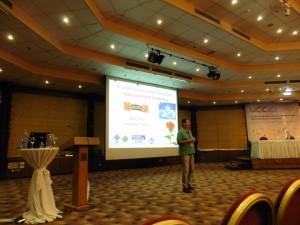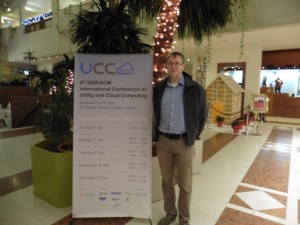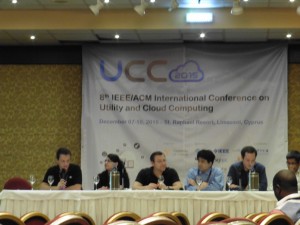On four days last year, from December 7 to 10 in 2015, two representatives of ICCLab and SPLab participated actively at the 8th IEEE/ACM International Conference on Utility and Cloud Computing (UCC 2015) which attracted about 150 academic and industrial researchers to the island of Cyprus where the University of Cyprus hosted the event close to the city of Limassol. The high density of technical talks, tutorials and poster presentations has conveyed solutions to the current and even near future issues in cloud computing.
 During the opening ceremony, the host and general organiser Prof. George Papadopoulos put the event into context. With only about 21% acceptance rate for full papers, it is quite competitive and we are happy to have had one of our papers accepted as full paper in the main track. In total, 276 reviews were written which shows the scale of the organisational effort. The most popular topic has been resource allocation in the cloud, an IaaS classic, followed by more diverse ones such as economic models, application scenarios, fault tolerance and federation. Furthermore, 10 workshops for edge topics and emerging trends were hosted which added network auto-configuration (SDN, NFV, NFC etc.), sustainable data centres, security and trust in clouds as well as smart city clouds to the mix, among other topics. Participants from dozens of countries presented their work in these areas.
During the opening ceremony, the host and general organiser Prof. George Papadopoulos put the event into context. With only about 21% acceptance rate for full papers, it is quite competitive and we are happy to have had one of our papers accepted as full paper in the main track. In total, 276 reviews were written which shows the scale of the organisational effort. The most popular topic has been resource allocation in the cloud, an IaaS classic, followed by more diverse ones such as economic models, application scenarios, fault tolerance and federation. Furthermore, 10 workshops for edge topics and emerging trends were hosted which added network auto-configuration (SDN, NFV, NFC etc.), sustainable data centres, security and trust in clouds as well as smart city clouds to the mix, among other topics. Participants from dozens of countries presented their work in these areas.
In a previous article, we have already given some details on the two papers that we now presented, the one in the main conference track and another one in a workshop on cloud applications management, one of the trending research topics. The presentations were given by Josef Spillner and highlighted the research progress achieved in the Service Prototyping Lab. Our presentations also pointed out the research approach with a focus on practical usefulness and open source results. The presentation slides and technical paper preprints are available as usual through our publications archive. All other papers, including cloud challenge results and posters, will soon be available through the ACM Digital Library and IEEExplore.
Overall, most of the talks proposed new methods which imply changes to the infrastructure, whereas very few concentrated on improvements by inherent application or data design advantages, which poses a barrier to adoption by the market. Inspiring for young researchers, three keynotes touched on greater challenges ahead of the cloud research community: multi-objective optimisation for task processing in workflows, cloud-delivered services for the real world, and services for scientific discoveries and data management from a supercomputing perspective.
 An inherent value of conference presentations compared to merely publishing in journals is the ability to network and exchange viewpoints during the breaks and in the evening activities. We made great use of this by discussing topics such as cloud computing adoption in African countries, the use of cloud services for sensitive document handling, and future service development and prototyping techniques. There was also some discussion on fog computing, delivering cloud services from the edge, which means from consumer-controlled devices and even wearables which can also be seen increasingly used in our labs. The Guifi approach seems to be a practical one by having a user-friendly way to enable simple network services (DNS, FTP), distributed services (Tahoe-LAFS storage), and potentially volunteer services (like the distributed desktop grid BOINC and its volunteer cloud ambitions). Having a wide installation base, opportunistic and decentralised volunteer clouds thus seem to become less of an academic exercise and more of a real possibility. The implication for companies is that instead of having to rely on provider-run marketplaces, dashboards and management interfaces, personal and enterprise cloud cockpits will become the norm and offer higher flexibility, more protection against vendor lock-in, and simply more choice by convenient and even automated switching to the best provider in every situation.
An inherent value of conference presentations compared to merely publishing in journals is the ability to network and exchange viewpoints during the breaks and in the evening activities. We made great use of this by discussing topics such as cloud computing adoption in African countries, the use of cloud services for sensitive document handling, and future service development and prototyping techniques. There was also some discussion on fog computing, delivering cloud services from the edge, which means from consumer-controlled devices and even wearables which can also be seen increasingly used in our labs. The Guifi approach seems to be a practical one by having a user-friendly way to enable simple network services (DNS, FTP), distributed services (Tahoe-LAFS storage), and potentially volunteer services (like the distributed desktop grid BOINC and its volunteer cloud ambitions). Having a wide installation base, opportunistic and decentralised volunteer clouds thus seem to become less of an academic exercise and more of a real possibility. The implication for companies is that instead of having to rely on provider-run marketplaces, dashboards and management interfaces, personal and enterprise cloud cockpits will become the norm and offer higher flexibility, more protection against vendor lock-in, and simply more choice by convenient and even automated switching to the best provider in every situation.
The international atmosphere of the event was reflected in a panel discussion on international cooperation, led by Prof. Alan Sill from Texas Tech University. The general notion was that there are several funding bodies which stress international cooperation, but they do not cooperate much by themselves so that e.g. US-EU cooperations are difficult to realise. From our side, Thomas Bohnert participated in the panel and gave input on this matter by hinting at academic career planning. One evident takeaway is that skills and visions in cloud computing and cloud-related services (including HPC, SaaS, VoIP) are good to have and thus young investigators are advised to start their careers in these areas.
 During the conference, the hosting sites for the next occasions were decided on. Next year, UCC 2016 will be hosted by Tongji University in Shanghai, China. The Call for Papers is already available and we look forward to bring together academics, industrial researchers and interesting business use cases for cloud computing and cloud applications again. ICCLab and SPLab are involved to support the organisational efforts and to offer a link to the unique applied sciences research methods. According to the outlook, in 2017 the conference will run in Austin, Texas, USA, and in 2018, we look forward to bring it to Switzerland! Stay tuned for news on that matter over the next year.
During the conference, the hosting sites for the next occasions were decided on. Next year, UCC 2016 will be hosted by Tongji University in Shanghai, China. The Call for Papers is already available and we look forward to bring together academics, industrial researchers and interesting business use cases for cloud computing and cloud applications again. ICCLab and SPLab are involved to support the organisational efforts and to offer a link to the unique applied sciences research methods. According to the outlook, in 2017 the conference will run in Austin, Texas, USA, and in 2018, we look forward to bring it to Switzerland! Stay tuned for news on that matter over the next year.